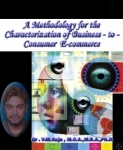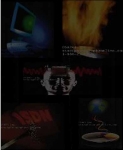A Methodology For The Characterization of Business-to-Consumer e_Commerce
Abstract Category: I.T.
Course / Degree: Ph.D
Institution / University: University of Malta, Malta
Published in: 2003
The area of electronic commerce is complex and multifaceted and its full conceptualization is still emerging. My thesis only concerns the category of consumer-oriented or business-to-consumer electronic commerce, deemed to have considerable market potential for the future. The context of electronic commerce is rich both in hype and hard facts, and interest in it has been fuelled by the potential size of the world-wide market resulting from the exponential growth of Internet adoption. Hype is exemplified by the success of the stock market capitalisation of many companies involved on it, regardless their performance in terms of profit generation. However there is much factual information to support the expectation of a large market size.
The business-to-consumer online market has yet to reach the critical mass to ensure its own future success. For that to happen, technological breakthroughs, such as the merging of Internet with TV broadcasting and mobile telephony, must permeate the market. Nevertheless, new technologies and the growth of Internet adoption might not be sufficient to realize the full potential of the online consumer market. In fact, this exponential growth has also been reported as the reason behind a worsening of online shopping customer service that threatens to put at risk customer loyalty in this marketing channel. This threat exemplifies the necessity to go beyond a merely technology-centred view to carefully explore customer needs and expectations.
The exploration of online consumers’ needs and expectations justifies a data-based analysis of their shopping behaviour, in order to provide a sound empirical basis for business decision making. Most of the existing studies in the area are basically qualitative in nature. Unfortunately, the quantitative research on consumer behaviour online is still pretty much in its infancy and there is still no quantitative framework for the analysis of online purchasing behaviour. This thesis aims to provide one such framework along the lines described in the following paragraph.
We aim in this thesis to put forward a complete quantitative methodology for the exploratory analysis of online consumers’ shopping behaviour. This methodology comprises several stages, namely:
Latent variable analysis: A survey data set containing a large number of online behaviour-related variables, from a sample of Internet users’ opinions of online shopping and online vendors, is made available for this research. The latent traits behind these consumer opinions are to be extracted, using factor analysis and labeled according to existing literature.
Predictive modelling: The latent factors obtained in the previous part, together with demographic, socio-economic and Web usage information, are to be used to construct a global predictive model of the propensity to buy online.
Cluster-based segmentation: Those factors selected as the best predictors of the propensity to buy online are to be used as bases for the segmentation of the online consumer market, utilizing a neural network-based model for data clustering and visualization: the Generative Topographic Mapping (GTM).
Graphical modeling: Having identified the different consumer segments, it will then be possible to apply Graphical Modelling separately to each segment, to produce graphs representing the inter-relationships between the predictive factors, or segmentation bases, and between these and the propensity to buy online.
According to this schema, the main goal of the thesis is to provide answers to the following questions:
A latent variable structure is to be obtained from the observable variables that refer to the Web users’ opinions of the online shopping channel and of the online shopping vendors. Is this structure explainable in terms of key factors identified in previous qualitative studies?
Which of those latent factors contain the necessary information to best predict Web users’ propensity to buy on-line?
Are variables, such as age, household income, and Web usage patterns, commonly used in market research, good predictors of that propensity?
To what extent can the propensity to buy online be inferred, using quantitative methods, from a selection of the latent factors shown to be the best predictors of such a propensity and how does it compare with the prediction obtained from the complete set of factors?
Can the e-commerce consumer market be segmented using latent factors as segmentation variables, in such a way that the resulting segments have a sensible managerial interpretation in terms of those factors and in terms of secondary information?
Is the neural network-based unsupervised model proposed in this thesis suitable for the task of segmentation of the online market?
Can graphical modeling provide further insight into the relational structure of the factors for each of the market segments?
Thesis Keywords/Search Tags:
E_commerce,B2B,B2C
This Thesis Abstract may be cited as follows:
"A METHODOLOGY FOR THE CHARACTERIZATION OF BUSINESS-TO-CONSUMER E_COMMERCE" is the thesis title name author V.M.Raja, for Ph.D degree at Rushmore University in Cayman Islands.
Submission Details: Thesis Abstract submitted by V.M.Raja from United States on 28-Jul-2004 16:15.
Abstract has been viewed 4965 times (since 7 Mar 2010).
V.M.Raja Contact Details: Email: vmraja@email.com
Disclaimer
Great care has been taken to ensure that this information is correct, however ThesisAbstracts.com cannot accept responsibility for the contents of this Thesis abstract titled "A Methodology For The Characterization of Business-to-Consumer e_Commerce". This abstract has been submitted by V.M.Raja on 28-Jul-2004 16:15. You may report a problem using the contact form.
© Copyright 2003 - 2025 of ThesisAbstracts.com and respective owners.

